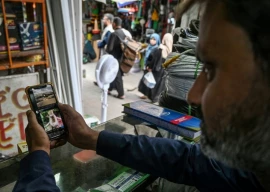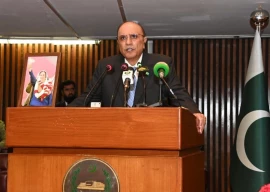
KARACHI:
The Sindh Assembly’s 168 MPAs are each paid a daily allowance of Rs3,000 for merely showing up. But little has been achieved by them in the 30 hours since December 16.
The problem has been continuous adjournments or fruitless discussions. And again, on Monday, the proceedings were adjourned without the house taking up any law-making business, this time because of the death of PPP MPA Mohsin Shah Bukhari. According to Speaker Nisar Ahmed Khuhro, it is the tradition of the house to adjourn the first session after the death of a seated MPA as a mark of respect.
But the below-par performance of the house of elected representatives has led opposition members to say that the government is not serious about fulfilling its primary responsibility of lawmaking.
PML-Q MPA Razzaque Rahimoon said, “We are not given permission to make legislation and the government is not willing either. It seems that the assembly passes its parliamentary days by celebrating holidays, because one day is fixed for a session and two days for leave.”
According to Rahimoon, the assembly has only managed 13 sittings with about 30 hours of proceedings. He said that they have made no significant progress, except for passing one bill and a few amendments.
The MQM’s Heer Ismail agreed with Rahimoon. According to her, the government is not paying attention to legislation and resolutions prepared by members. “We work hard to make a bill with the consultation of lawyers, but at the eleventh hour, our bills are turned down,” she said.
The pain is caused to the taxpayer, who is footing the bill. Most members, who attended the 30-day session will earn Rs80,000 to Rs90,000 for the period. “But there seems to be no outcome from it,” Rahimoon said. He calculated that the government spends Rs504,000 daily on allowances for 168 MPAs.
Arif Mustafa Jatoi of the National Peoples Party said that the seriousness of MPAs is evident from how most PPP members left the house when a resolution on party founder Zulfikar Ali Bhutto was being discussed, which prompted the PPP parliamentary leader to lodge a complaint against absentee members with its leadership. “Instead of taking it seriously, the ruling party members start criticising the performance of the last government,” he said.
“Tuesday is fixed as private member day. Members are supposed to bring their resolutions, bills and motions, but rarely has the agenda been completed,” he said. “As a public representative and one of the members of assembly, I want to ask what is the outcome of the budget allocated to the assembly secretariat, which is more than Rs500 million,” Jatoi said.
Rahimoon alleged that ministers and bureaucrats do not attend the assembly sessions in order to avoid answering questions. Jatoi went a step further – to him, the PPP does not consider the assembly a legislative forum but one to gossip in and fulfil the constitutional requirement of the number of days the assembly has to be in session.
During the sessions, members often send written requests to the speaker to adjourn the sitting because they have other engagements. “Saheb is in the city. We have to meet him. I request you to adjourn the session as soon as you can,” is an oft-repeated refrain from Law Minister Ayaz Soomro when President Asif Ali Zardari is in Karachi.
According to Jatoi, the number of parliamentary days in a year was increased to 100 from 70 after the passage of the 18th Amendment. Sixty-two days have been completed so far. “PPP members used to raise an alarm over the lack of quorum and an incomplete agenda when they were in the opposition. But they are now following the trend.”
The government, however, believes that it has surpassed previous records by passing bills, resolutions and taking up important issues. “We have moved around 11 bills and passed 17 resolutions,” said Ayaz Soomro. According to the law minister, Benazir Bhutto and Zulfikar Ali Bhutto were public leaders, so the session had to be adjourned to mark their birth and death anniversaries. “It is a democratic government in which members criticise the government and inquire about the progress of the assembly. Talking about assembly progress was banned in the last government,” Soomro said.
Published in The Express Tribune, January 17th, 2012.
COMMENTS (7)
Comments are moderated and generally will be posted if they are on-topic and not abusive.
For more information, please see our Comments FAQ


















































good aspect. But pls pursue it until change takes place
@ Azfar, What are you referring to by no opposition ?? PPP has 2/3rd majority in the parliament thats why you dont hear about opposition but the fact is that MQM and PPP members have disagreement over almost everything.
The problem is that legislators have forgotten that their job is to legislate. The members spend most of their time is hurling accusations at one another or demanding plots and quotas.
No opposition in SINDH assembly , wah ji ... what a tribute to democracy. Only service Sindh elected representatives give is to fight each other, after a little time. MQM is busy passing the province resolution , where as PPP Ministers are busy flying to Islamabad or posing for billboards. Whats the use of this assembly, Zardari and governor house can use Skype, why waste taxpayers money. All i know Sindh ministers had achieved in these 4 years is, upgrading their Land Cruiser model with the newest one. Period
You keep selecting them they will make money from them!
and then they complain that democracy is not allowed to flourish in pakistan...when will they learn from their own mistakes instead of criticizing other institutions and ex governments!
Now that the waste is identified it is time for taking action to stop this public money waste. Who is responsible for starting this fix?